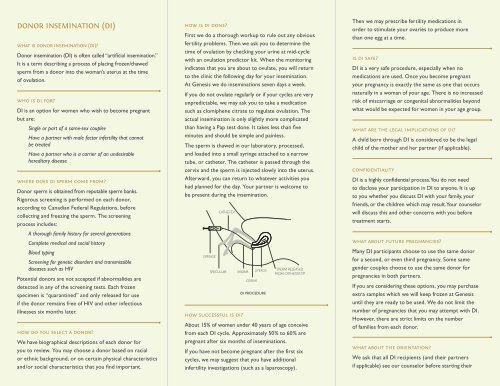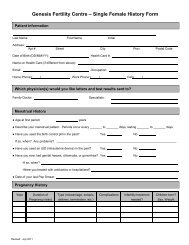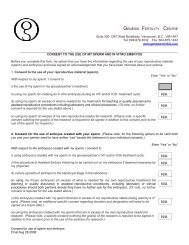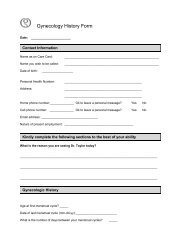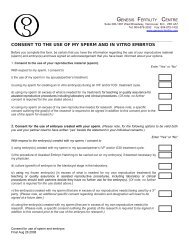Donor sperm insemination brochure - Genesis Fertility Centre
Donor sperm insemination brochure - Genesis Fertility Centre
Donor sperm insemination brochure - Genesis Fertility Centre
Create successful ePaper yourself
Turn your PDF publications into a flip-book with our unique Google optimized e-Paper software.
donor <strong>insemination</strong> (di)what is donor <strong>insemination</strong> (di)?<strong>Donor</strong> <strong>insemination</strong> (DI) is often called “artificial <strong>insemination</strong>.”It is a term describing a process of placing frozen/thawed<strong>sperm</strong> from a donor into the woman’s uterus at the timeof ovulation.who is di for?DI is an option for women who wish to become pregnantbut are:Single or part of a same-sex couplevHave a partner with male factor infertility that cannotbe treatedHave a partner who is a carrier of an undesirablehereditary diseasewhere does di <strong>sperm</strong> come from?<strong>Donor</strong> <strong>sperm</strong> is obtained from reputable <strong>sperm</strong> banks.Rigorous screening is performed on each donor,according to Canadian Federal Regulations, beforecollecting and freezing the <strong>sperm</strong>. The screeningprocess includes:A thorough family history for several generationsComplete medical and social historyBlood typingScreening for genetic disorders and transmissiblediseases such as HIVPotential donors are not accepted if abnormalities aredetected in any of the screening tests. Each frozenspecimen is “quarantined” and only released for useif the donor remains free of HIV and other infectiousillnesses six months later.how do you select a donor?We have biographical descriptions of each donor foryou to review. You may choose a donor based on racialor ethnic background, or on certain physical characteristicsand/or social characteristics that you find important.how is di done?First we do a thorough workup to rule out any obviousfertility problems. Then we ask you to determine thetime of ovulation by checking your urine at mid-cyclewith an ovulation predictor kit. When the monitoringindicates that you are about to ovulate, you will returnto the clinic the following day for your <strong>insemination</strong>.At <strong>Genesis</strong> we do <strong>insemination</strong>s seven days a week.If you do not ovulate regularly or if your cycles are veryunpredictable, we may ask you to take a medicationsuch as clomiphene citrate to regulate ovulation. Theactual <strong>insemination</strong> is only slightly more complicatedthan having a Pap test done. It takes less than fiveminutes and should be simple and painless.The <strong>sperm</strong> is thawed in our laboratory, processed,and loaded into a small syringe attached to a narrowtube, or catheter. The catheter is passed through thecervix and the <strong>sperm</strong> is injected slowly into the uterus.Afterward, you can return to whatever activities youhad planned for the day. Your partner is welcome tobe present during the <strong>insemination</strong>.SYRINGESPECULUMCATHETERVAGINACERVIXUTERUSDI PROCEDURESPERM RELEASEDFROM CATHETER TIPhow successful is di?About 15% of women under 40 years of age conceivefrom each DI cycle. Approximately 50% to 60% arepregnant after six months of <strong>insemination</strong>s.If you have not become pregnant after the first sixcycles, we may suggest that you have additionalinfertility investigations (such as a laparoscopy).Then we may prescribe fertility medications inorder to stimulate your ovaries to produce morethan one egg at a time.is di safe?DI is a very safe procedure, especially when nomedications are used. Once you become pregnantyour pregnancy is exactly the same as one that occursnaturally in a woman of your age. There is no increasedrisk of miscarriage or congenital abnormalities beyondwhat would be expected for women in your age group.what are the legal implications of di?A child born through DI is considered to be the legalchild of the mother and her partner (if applicable).confidentialityDI is a highly confidential process. You do not needto disclose your participation in DI to anyone. It is upto you whether you discuss DI with your family, yourfriends, or the children which may result. Your counselorwill discuss this and other concerns with you beforetreatment starts.what about future pregnancies?Many DI participants choose to use the same donorfor a second, or even third pregnancy. Some samegender couples choose to use the same donor forpregnancies in both partners.If you are considering these options, you may purchaseextra samples which we will keep frozen at <strong>Genesis</strong>until they are ready to be used. We do not limit thenumber of pregnancies that you may attempt with DI.However, there are strict limits on the numberof families from each donor.what about the orientation?We ask that all DI recipients (and their partnersif applicable) see our counselor before starting their
treatment cycles. You have a one hour counselingsession included as part of your orientation, andadditional sessions are available on a fee-for-servicebasis. This is not a screening test to determine youreligibility but, rather, a way to help you becomeemotionally and socially prepared for the DI process.You will start your treatment once you and yourcounselor are comfortable that you have consideredthe various emotional, social, and ethical issuesassociated with DI. As well, you will spend timewith a nurse to become familiar with the cycle protocol.what is the cost of di?Fees: Your initial orientation will cost $250, which includesa consultation with one of our nurses to discuss donorselection, cycle monitoring, and cycle costs, plus $125for a one hour session with one of our counselors.There is a fee for each frozen specimen (straw) purchasedand the subsequent preparation of the specimen for<strong>insemination</strong>, as well as an annual storage fee. Pleasesee our current price list for more details.of couples achieve their dream of having a baby.Whether you have just discovered that you havea fertility problem or have been struggling foryears, <strong>Genesis</strong> <strong>Fertility</strong> offers you a unique blendof patient-centered care and state-of-the-artreproductive technology. At your first visit yourphysician will carefully assess you and your partner’scondition and develop a personalized treatment plandesigned to give you the best chance of conceiving.costs Infertility consultations and tests are coveredby MSP.confidentiality All services are provided in acompletely discreet and confidential environment.donor <strong>insemination</strong> (di)optimizing your chancesWeight: It is important to be at a healthy weight foryour height. Women with a body mass index under19 or over 32 have a lower chance of getting pregnantand an increased risk of miscarriage.Smoking: Women who smoke have a lower chanceof becoming pregnant and a higher rate of miscarriage.Supplements: We recommend that you take a multivitamincontaining folic acid (0.4 to 1.0 mg daily). This B vitaminreduces the risk of some serious defects of the brainand spinal cord in the fetus. You should start takingit a few weeks before your treatment begins.<strong>Genesis</strong> <strong>Fertility</strong> <strong>Centre</strong> is one of the largest IVF programsin Canada, and our success rates are among the bestin the country. We have been at the forefront ofreproductive medicine since 1995, helping thousandsvancouver #300 – 1367 W Broadway Avenue, Vancouver, BCsurrey #116 – 13798 94A Avenue, Surrey, BCFor a referral to either office:tel 604.879.3032 | fax 604.875.1432email genesis@genesis-fertility.com | web www.genesis-fertility.comApril 2008


